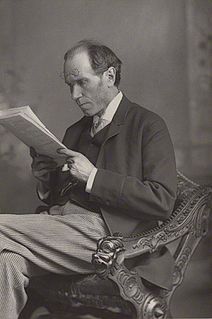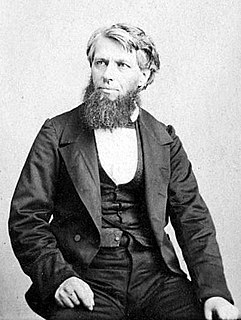A Quote by James Payn
The fact is, if a young man is naturally indolent, the spur of necessity will drive him but a very little way, while the having enough to live upon is often the means of preserving his self-respect.
Related Quotes
Men are naturally lazy, and require some great stimulus to goad their flagging ambitions and enable them to overcome the inertia which comes from ease and the consciousness of inherited wealth. Whatever lessens in a young man the feeling that he must make his way in the world cripples his chance of success. Poverty has ever been the priceless spur that has goaded man up to his own loaf.
Why prove to a man he is wrong? Is that going to make him like you? Why not let him save face? He didn't ask for your opinion. He didn't want it. Why argue with him? You can't win an argument, because if you lose, you lose it; and if you win it, you lose it. Why? You will feel fine. But what about him? You have made him feel inferior, you hurt his pride, insult his intelligence, his judgment, and his self-respect, and he'll resent your triumph. That will make him strike back, but it will never make him want to change his mind. A man convinced against his will is of the same opinion still.
It is disgraceful to live at the cost of one's self-respect. Self-respect is the most vital factor in life. Without it, man is a cipher. To live worthily with self-respect, one has to overcome difficulties. It is out of hard and ceaseless struggle alone that one derives strength, confidence and recognition.
Self-indulgence takes many forms. A man may be self-indulgent in speech, in touch, in sight. From self-indulgence a man comes to idle speech and worldly talk, to buffoonery and cracking indecent jokes. There is self-indulgence in touching without necessity, making mocking signs with the hands, pushing for a place, snatching up something for oneself, approaching someone else shamelessly. All these things come from not having the fear of God in the soul and from these a man comes little by little to perfect contempt.
Self Esteem::"It is very easy in the world to live by the opinion of the world. It is very easy in solitude to be self-centered. But the finished man is he who in the midst of the crowd keeps with perfect sweetness the independence of solitude. I knew a man of simple habits and earnest character who never put out his hands nor opened his lips to court the public, and having survived several rotten reputations of younger men, honor came at last and sat down with him upon his private bench from which he had never stirred."
Self-observation brings man to the realization of the necessity of self-change. And in observing himself a man notices that self-observation itself brings about certain changes in his inner processes. He begins to understand that self-observation is an instrument of self-change, a means of awakening.
There is a fundamental moral difference between a man who sees his self-interest in production and a man who sees it in robbery. The evil of a robber does not lie in the fact that he pursues his own interests, but in what he regards as to his own interest; not in the fact that he pursues his values, but in what he chose to value; not in the fact that he wants to live, but in the fact that he wants to live on a subhuman level.
War means fighting. The business of the soldier is to fight. Armies are not called out to dig trenches, to throw up breastworks, to live in camps, but to find the enemy and strike him; to invade his country, and do him all possible damage in the shortest possible time. This will involve great destruction of life and property while it lasts; but such a war will of necessity be of brief continuance, and so would be an economy of life and property in the end.
A man vows, and yet will not east away the means of breaking his vow. Is it that he distinctly means to break it? Not at all; but the desires which tend to break it are at work in him dimly, and make their way into his imagination, and relax his muscles in the very moments when he is telling himself over again the reasons for his vow.
I suspect it was...the old story of the implacable necessity of a man having honour within his own natural spirit. A man cannot live and temper his mettle without such honour. There is deep in him a sense of the heroic quest; and our modern way of life, with its emphasis on security, its distrust of the unknown and its elevation of abstract collective values has repressed the heroic impulse to a degree that may produce the most dangerous consequences.






































